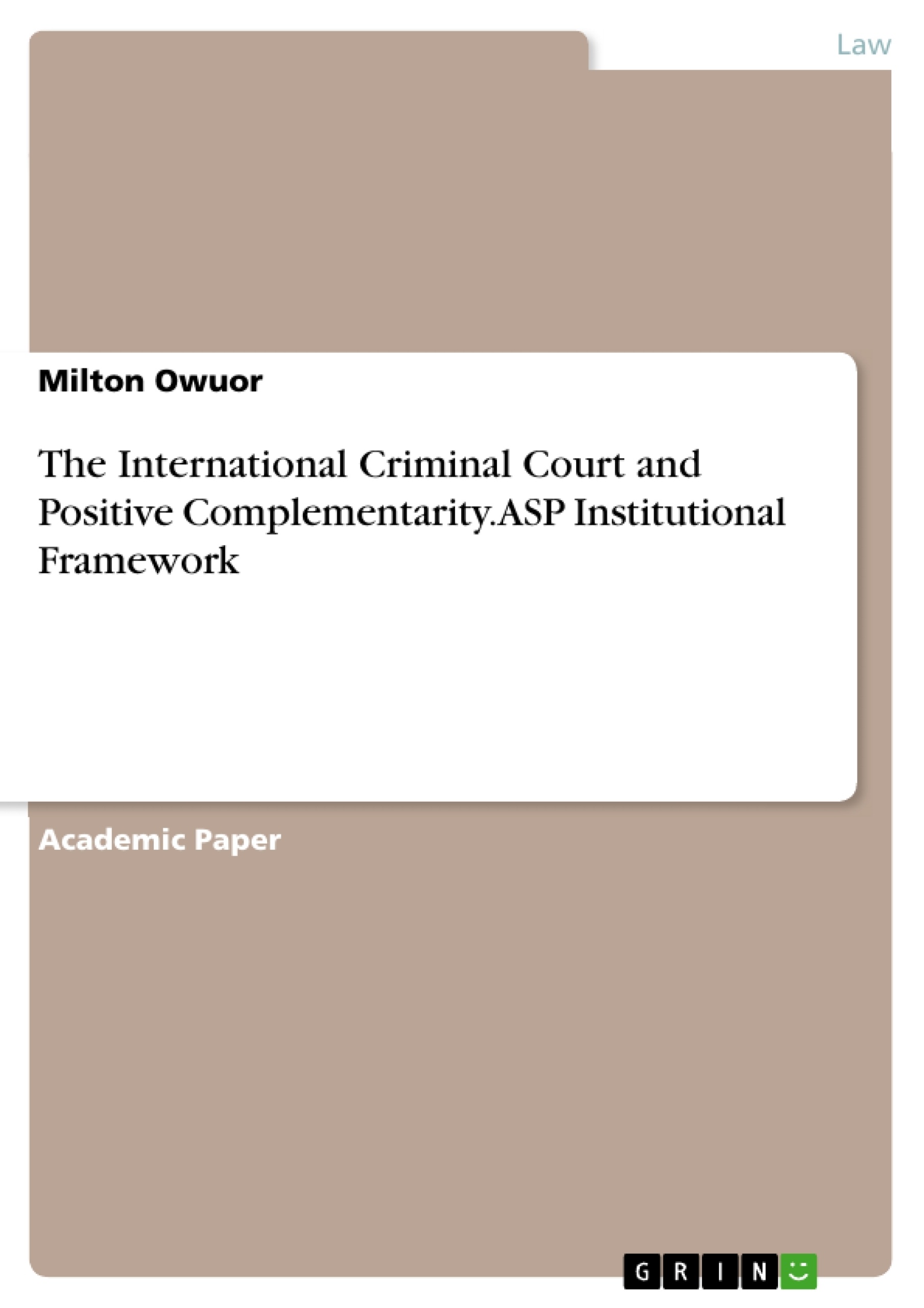This study seeks to establish how the legal and institutional framework for positive complementarity may be effectively implemented. It is argued that the existing legal and institutional framework in respect of the effective combatting of impunity is largely unsatisfactory.
The evolution of the principle of complementarity, in the context of the Rome Statute, is explored with emphasis on the theoretical constraints on the principle which, in turn, raise practical challenges. The analysis provides a theoretical background to the conceptualisation of positive complementarity.
The study traces the evolution and development of the concept of positive complementarity, examining its characteristic features and attributes, and the possibilities and opportunities the concept presents for the effective combatting of impunity. It examines the various scholarly arguments and propositions advanced to explain the concept of positive complementarity, and analyses the attendant challenges and limitations. It is noted that there is no fixed and universally acceptable definition of positive complementarity. It is therefore argued that there is a need for the establishment of a coherent legal and institutional framework for positive complementarity.
In this light, appropriate policy alternatives and considerations both domestically and internationally, are considered. On the international level limitations characterising the current institutional framework of the Secretariat of the Assembly of States Parties (ASP Secretariat) are identified. It is argued that a fundamental restructuring of the ASP Secretariat is essential and measures to restructure the ASP Secretariat in order to reinforce its effectiveness in fulfilling its mandate on positive complementarity are identified. At the domestic level, the various aspects of implementing legislation are discussed.
In conclusion, the establishment of an independent office to address positive complementarity and revitalise the institutional framework within the legal structures of the ASP Secretariat, is examined. The study envisages that the proposed institutional framework for the ASP Secretariat, if implemented, would effectively support the national jurisdictions of state parties in their implementation of the concept of positive complementarity. This study represents an unequivocally original contribution to knowledge and research.
Inhaltsverzeichnis (Table of Contents)
- PARTI INTRODUCTION AND OVERVIEW
- Introduction.
- PART II THE CONCEPT OF POSITIVE COMPLEMENTARITY
- Background
- The definition of positive complementarity: A normative challenge
- Legal foundations of positive complementarity.
- 2010 Kampala Review Conference on Stocktaking of the Rome Statute..............
- The Greentree process...
- PART III - INSTITUTIONAL FRAMEWORK.
- The Secretariat of the ASP and positive complementarity.
- Why a new legal and institutional regime?..........\n
- PART IV CONCLUSION AND RECOMMENDATIONS
- Conclusions
- Recommendations....
Zielsetzung und Themenschwerpunkte (Objectives and Key Themes)
This paper examines the concept of positive complementarity, particularly within the framework of the International Criminal Court (ICC). Its primary objectives are to analyze the definition, scope, and nature of positive complementarity, while also evaluating the legal and institutional framework established by the Assembly of State Parties (ASP) for its implementation. The paper highlights opportunities, benefits, and challenges associated with positive complementarity.
- Definition and scope of positive complementarity
- Legal and institutional framework for implementation
- Opportunities and challenges of positive complementarity
- Role of the ASP Secretariat in promoting positive complementarity
- Need for a new legal and institutional regime
Zusammenfassung der Kapitel (Chapter Summaries)
- PART I: INTRODUCTION AND OVERVIEW
- This chapter provides an introduction to the concept of positive complementarity and outlines the paper's objectives. It highlights the lack of literature on positive complementarity and its institutional framework.
- PART II: THE CONCEPT OF POSITIVE COMPLEMENTARITY
- This chapter explores the background and evolution of the concept of positive complementarity, examining its definition, normative challenges, and legal foundations.
- PART III: INSTITUTIONAL FRAMEWORK
- This chapter examines the role of the ASP Secretariat in promoting positive complementarity and identifies limitations within the current institutional framework.
Schlüsselwörter (Keywords)
The primary keywords and focus topics of this paper are: positive complementarity, international criminal law, institutional framework, Assembly of State Parties (ASP), impunity, International Criminal Court (ICC), and national criminal jurisdictions. The paper explores the legal and institutional challenges and opportunities related to the implementation of positive complementarity within the ICC system.
- Quote paper
- Dr. Milton Owuor (Author), 2017, The International Criminal Court and Positive Complementarity. ASP Institutional Framework, Munich, GRIN Verlag, https://www.grin.com/document/429163




